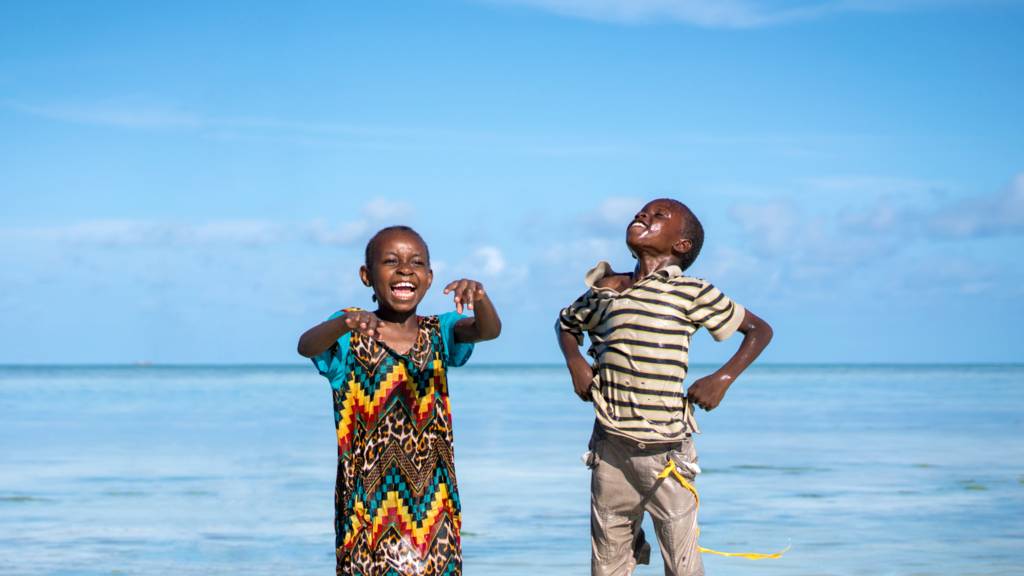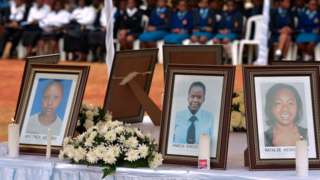
Live
Africa Live this week: 21-27 February 2022
Bringing you the latest news from around Africa at bbc.com/africalive. This is an automated feed over night and at weekends.

Bringing you the latest news from around Africa at bbc.com/africalive. This is an automated feed over night and at weekends.
Live Reporting
All times stated are UK
Get involved




Tay GrinCopyright: Tay Grin Tay Grin says his music is a fusion of modern day sounds and drumsImage caption: Tay Grin says his music is a fusion of modern day sounds and drums 
Getty ImagesCopyright: Getty Images Video caption: The Resident Presidents mull high-end carsThe Resident Presidents mull high-end cars View more on twitterView more on twitter - How the invasion will affect Africa
Video caption: Nigerian student in Ukraine: 'I'm afraid but don't want to panic'Nigerian student in Ukraine: 'I'm afraid but don't want to panic' 
@lucienbodoCopyright: @lucienbodo The man (L) hit the naked child with a rubber hose and a machete (pictured)Image caption: The man (L) hit the naked child with a rubber hose and a machete (pictured) 
AFPCopyright: AFP Chukwudimeme Onwuamadike was arrested after a businessman he had kidnapped escaped and told police of his whereaboutsImage caption: Chukwudimeme Onwuamadike was arrested after a businessman he had kidnapped escaped and told police of his whereabouts - EYEWITNESS: 'I was kidnapped and now only travel by train'
- ANALYSIS: Outrage at Nigeria's brazen bandit attacks
- EXPLAINER: Why schoolchildren are being abducted in Nigeria
- BACKGROUND: How a $30m scheme failed to stop kidnappings

OBNCopyright: OBN Sifan Fita (L) and Koket Tesfaye (R) are among the top scorers of Ethiopia’s university entrance examImage caption: Sifan Fita (L) and Koket Tesfaye (R) are among the top scorers of Ethiopia’s university entrance exam 
ReutersCopyright: Reuters The dam's first turbine began operating earlier this monthImage caption: The dam's first turbine began operating earlier this month - River Nile dam: Why Ethiopia can't stop it being filled


MSFCopyright: MSF MSF helps those in northern Cameroon affected by jihadist violence in the regionImage caption: MSF helps those in northern Cameroon affected by jihadist violence in the region 


AFPCopyright: AFP Col Doumbouya seized power last yearImage caption: Col Doumbouya seized power last year 



Video caption: Nigerian student in Ukraine: 'I'm afraid but don't want to panic'Nigerian student in Ukraine: 'I'm afraid but don't want to panic' 
Getty ImagesCopyright: Getty Images The 2019 general election recorded the lowest turnout in Nigeria since the return of democracy in 1999Image caption: The 2019 general election recorded the lowest turnout in Nigeria since the return of democracy in 1999
Latest PostThis page is now closed
For the latest updates, please go to bbc.com/africalive.
How Russia forged closer ties with Africa
By Ilya Barabanov
BBC News Russian
Russia has rebuilt military and diplomatic links with the continent in its search for new allies.
Read moreRussia Ukraine crisis – 'E dey very painful wen as a father you no fit help your own pikin'
One Nigerian based professional football coach wey family base for Ukraine dey cry out as Russia troops invasion continue.
Read moreHow Tay Grin uses hip-hop to showcase his culture
DJ Edu
Presenter of This Is Africa on BBC World Service
Tay Grin is a hip-hop artist with a strong connection to Malawian musical traditions. He has won national awards and has his own record label.
He calls his sound Nyau music, and he's known in Malawi as the “Nyau King”.
"My sound originates from the soil. It's a fusion of modern day sounds and drums. I'm from a tribe called the Chewa, and when I'm performing on stage I have my traditional drummers. Even our dancing is a fusion of traditional and modern day dance."
Tay Grin explains that they use specific Nyau drums that have to be warmed up over a fire to thicken the hide.
"This gives them a quality that doesn't sound like any other drum you've ever heard. It's a very spiritual sound. When you watch the set it's a portrayal of who we are as a people."
His biggest song is called Chipapapa featuring 2Baba from Nigeria.
"Chipapapa comes from a game that we used to play as kids and I turned it into a song that everyone can enjoy. It became a huge hit because it resonates with both the younger and older generations.
Tay Grin grew up listening to many different artists in his household.
"My mum used to love Kwassa Kwassa so I grew up listening to Kofi Olomide, Papa Wemba and Pepe Kalle."
Ironically he dropped out of music classes when he was in high school because he was getting bad grades.
"Fast forward a few years and here I am. Music is a thing that I do every day."
Tay Grin has a close relationship with his mother: "She has always supported me from the beginning. She even made an appearance in one of my music videos."
His mother worked with the United Nations and when she retired from the UN and returned to Malawi she became a cabinet minister.
"Watching my mum in all these leadership roles has sharpened my skills and I hope that one day I can look back and say I've also done great things."
Tay Grin has also run for political office himself, but came second.
"I care passionately about the development of my nation. There is a possibility that I might go back, but I think music is the focus now, and there's a lot more that needs to happen in terms of developing the music industry back home and getting Malawi on the map internationally."
He says he has many exciting projects on the way with his third album dropping this year, and a new song on its way celebrating the Chewa king.
"I'm proudly showcasing my culture to the world".
You can hear my full interview with Tay Grin this weekend on This Is Africa on BBC World Service radio and partner stations across Africa
Scroll down for this week's stories
We'll be back on Monday morning
That's all for now from the BBC Africa Live team this week until Monday morning, when we'll be back at bbc.com/africalive.
There will be an automated news feed until then. You can also get the latest news from our website and listen to the Africa Today podcast.
Here's a reminder of Friday's wise words:
Click here to send us your African proverbs.
And we leave you with this shot of a camel race in Sudan, one of our favourites from this week's gallery of the best photographs from around the continent:
The Resident Presidents and million-dollar cars
Friday satire from BBC Focus on Africa radio
Taking his cue from Kenya’s President Uhuru Kenyatta, one of our fictional presidents - Olushambles - decides he wants a new presidential car.
But Kibarkingmad is dubious - and thinks air travel is the answer.
Listen to the latest from the veteran leaders:
Video content
Twitter Space aids stranded Nigerians in Ukraine
A live audio chat has been taking place on Twitter for Nigerian students caught up in the conflict in Ukraine.
During the Twitter Space, advice was shared - mainly warning that people should not travel alone.
People shared their experiences in different parts of the country a day after Russian troops invaded.
Numbers were shared of Nigerian contacts in Poland, and other neighbouring countries, if people managed to cross borders. Rawlings Onyi, a Nigerian in Poland, has been posting the information on his Twitter feed.
There have been some reports that Nigerians were being denied entry into Poland.
One person, whose Twitter profile says she is based in Poland, told the forum she was at the Poland-Ukraine border and Nigerians were being allowed in, though some said those with expired documents had been turned back.
“So there's a long queue but a lot of students have been able to get into Poland from the border,” she said.
She has since tweeted with further advice, saying Nigerians at the border should ask for a humanitarian visa:
An estimated 4,000 Nigerians are studying in Ukraine.
More on the Ukraine crisis:
Video content
Cameroon teacher arrested after viral beating video
Guy Bandolo
BBC News, Yaoundé
Police in Cameroon have arrested a teacher after a video emerged online allegedly showing him brutally beating a nine-year-old boy.
The incident is suspected to have taken place at a primary school in Doula, Cameroon's economic capital.
The video has been widely shared on social networks causing a wave of indignation.
It shows a totally naked boy being held by his arms and feet by four other children, while a man hits him with a rubber hose and then a machete.
According to an eyewitness, the pupil was punished for failing to give a reason for his absence from school for a few days.
A police investigation is under way.
Corporal punishment is outlawed in Cameroon, but some schools still use it.
Nigerian kidnapping kingpin sentenced to life
Nigerian kidnapping kingpin Chukwudimeme Onwuamadike, widely known as "Evans”, has been sentenced to life in prison.
A judge in Lagos also sentenced two co-defendants to life for abducting businessman Donatus Dunu in 2017.
The CEO of a pharmaceuticals firm was held for nearly three months before managing to escape and telling police about his ordeal. This enabled officers to catch Evans and his gang.
An employee of Maydon Pharmaceuticals Ltd told the court in 2018 that he had paid a ransom of about $260,000 (£195,000) to the kidnappers for the release of his boss - but he had not been freed.
Justice Hakeem Oshodi said the men showed no remorse for their crimes.
“I believe a lesson must be taught,” he was quoted as saying when handing down the sentence
For several years, gangs nationwide have been kidnapping both rich and poor people - and sometimes killing abductees whose families fail to pay, and often demanding more money once a first ransom has been paid.
More on Nigeria's kidnapping crisis:
Two Ethiopian students score 100% in entrance exams
BBC Afaan Oromoo
Two Ethiopian students have scored 100% in their university entrance exams - and are being lauded online.
Sifan Fita got her top marks for maths and Koket Tesfaye in physics - a difficult feat that is rarely achieved.
“I knew the maths exam was a more difficult than other subjects, so I invested my time wisely and studied hard,” Ms Sifan, who comes from western Oromia and plans to study software engineering, told the BBC.
Her school head, Abebe Zewdie, told the BBC the mark was arguably the highest ever attained by a female student in the exams.
Mr Koket has plans to study construction engineering.
Kenya to buy electricity from Ethiopia's mega dam
Jewel Kiriungi
BBC News, Nairobi
Kenya plans to buy electricity from Ethiopia mega River Nile dam that began generating power for the first time last weekend.
Ethiopia hopes to generate about $1bn (£746m) in annual revenue from electricity exports to neighbouring countries and beyond.
A new agreement was reached between the two neighbours earlier this month. It is not yet clear how much power Kenya is signing up for and at what cost.
Kenyan Energy Minister Monica Juma said this move would be key to powering the country’s economic growth.
The first turbine at the Grand Ethiopian Renaissance Dam (Gerd) has begun generating 375 megawatts (MW) of power.
Ethiopia started building the $4bn dam in its northern highlands, from where 85% of the Nile's waters flow, in 2011.
When the reservoir behind the dam has filled it is expected to generate more than 5,000 MW of electricity by 2024.
This will more than double Ethiopia’s current electricity output.
However, the dam has long been a source of contention between Ethiopia and downstream countries Sudan and Egypt.
They see the dam as a threat to their water security because of their high dependence on the River Nile.
More on the mega dam:
MSF workers kidnapped in northern Cameroon
BBC World Service
Newsroom
Armed men in northern Cameroon have kidnapped five people working for Médecins Sans Frontières (MSF), local officials say.
The abduction of the French medical charity employees took place during an attack in Cameroon's Far North region that lies between Nigeria to the west and Chad to the east.
Militant Islamist groups are known to operate in the area but local officials say there is no evidence of a jihadist attack.
Those abducted are three aid workers of Chadian, Senegalese and French-Ivorian nationality, as well as two Cameroonian security guards.
Mosque could be built to honour cancer campaigner
Amani Liaquat, 23, passed away on Monday, after being diagnosed with brain cancer 22 months ago.
Read moreGuinean junta suspends Ukraine's honorary consul
Nicolas Negoce
BBC News
Ukraine’s honorary consul in Guinea has been suspended for “gross negligence” for urging the junta to make clear its position on Russia’s invasion of Ukraine.
Charles Amara Sossoadouno, a Guinean citizen, had made the call on social media in the hours after the invasion began on Thursday.
Guinea’s Foreign Minister Morissanda Kouyaté said the decision to suspend him was taken at a later crisis meeting about the conflict, where the situation for around 800 Guineans living in Ukraine was also discussed.
He said Col Mamady Doumbouya, Guinea’s interim president, wanted all necessary measures to be taken to support them.
No more was said about the conflict.
Like Mali and Burkina Faso, Guinea had been suspended from the West African body Ecowas following a military takeover, which took place last September.
Col Doumbouya has since set up a transitional government, promising to hand over to civilian rule.
Abdou stands down as Comoros coach
By Mark Gleeson
Football writer
Comoros coach Amir Abdou quits after eight years at helm, convinced the tiny Indian Ocean island nation's team needs new direction.
Read moreKenyan schoolgirl jailed over student fire deaths
By Ashley Lime
BBC News, Nairobi
Ten girls died in the 2017 fire started by a student trying to get a transfer to another school.
Read moreZimbabwe hits back after Fifa ban
Zimbabwe hits back at Fifa after the southern Africans and Kenya are banned from world football because of governmental interference in the running of the game.
Read moreWelsh drone system fights malaria in Zanzibar
By Dafydd Morgan
BBC News
The drones are being used to find pools of water that mosquitos use to breed.
Read moreNigerian student in Ukraine: 'I'm afraid'
Video content
Nigerian student Jessica Orakpo is stuck in Ukraine following Russia's invasion of the country.
BreakingNigerian votes to be collated electronically
The new guidelines are intended to stop rigging
Nduka Orjinmo
BBC News, Abuja
Nigeria's president has signed into law new election guidelines that will allow votes cast on election day to be electronically collated, ending years of controversy.
Analysts have blamed the manual collation of results as one of the factors responsible for widespread rigging, which is also linked to increasing voter apathy in Africa's most-populous nation.
Now polling stations will be able to electronically send their results to electoral commission.
Civil society groups have welcomed the news ahead of elections next year.
The chairman of the main opposition People's Democratic Party (PDP) said the new law would make elections "impossible to rig".